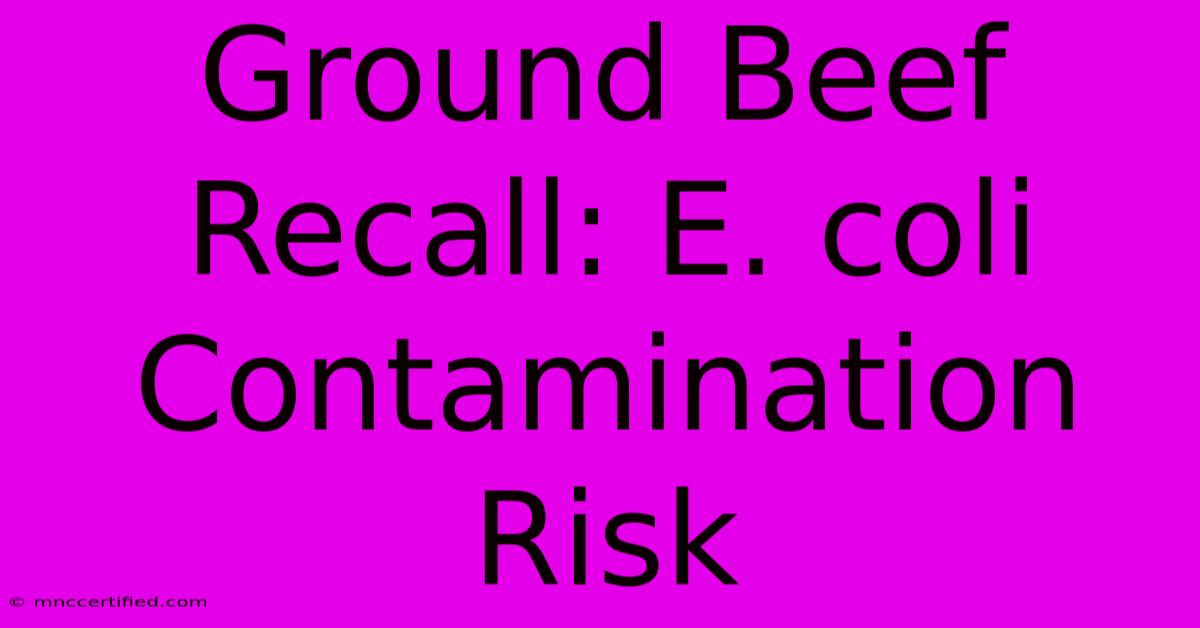Ground Beef Recall: E. Coli Contamination Risk

Table of Contents
Ground Beef Recall: E. coli Contamination Risk - What You Need to Know
Recent recalls of ground beef due to E. coli contamination highlight the critical importance of food safety. This article will guide you through understanding the risks associated with contaminated ground beef, how to identify recalled products, and what steps to take to protect your family. We'll also delve into the prevention and handling of ground beef to minimize the risk of E. coli infection.
Understanding the E. coli Threat in Ground Beef
Escherichia coli (E. coli) is a type of bacteria that can cause serious foodborne illness. While many strains of E. coli are harmless, some, like E. coli O157:H7, produce toxins that can lead to severe symptoms. Ground beef is particularly vulnerable to E. coli contamination because the grinding process can spread bacteria throughout the meat. Even if the initial beef was free from contamination, cross-contamination during processing can introduce E. coli.
Symptoms of E. coli Infection
Symptoms of E. coli infection typically appear within two to eight days of consuming contaminated food. They can range from mild to severe and include:
- Diarrhea (often bloody): This is a common and often severe symptom.
- Stomach cramps: Intense abdominal pain is characteristic of E. coli infection.
- Vomiting: This can be accompanied by nausea.
- Fever: While not always present, a fever may indicate a more serious infection.
- Dehydration: Severe diarrhea and vomiting can lead to dangerous dehydration.
If you experience these symptoms after consuming ground beef, seek immediate medical attention. E. coli infection can be particularly dangerous for young children, the elderly, and individuals with weakened immune systems.
How to Identify Recalled Ground Beef Products
Ground beef recalls are frequently announced by government agencies like the USDA's Food Safety and Inspection Service (FSIS). To stay informed:
- Check the FSIS website: Regularly visit the FSIS website for the latest recall information. They provide detailed information about recalled products, including brand names, package codes, and "use by" dates.
- Sign up for recall alerts: Many food companies and regulatory agencies offer email or text alerts to notify consumers about recalls.
- Check your refrigerator: If you have ground beef in your refrigerator, carefully compare the package labeling to any recall information you find online or in the media.
Safe Handling and Cooking of Ground Beef
Preventing E. coli contamination starts with proper food handling practices:
- Wash your hands: Thoroughly wash your hands with soap and water before and after handling raw ground beef.
- Clean surfaces: Sanitize all surfaces that come into contact with raw ground beef, including cutting boards, countertops, and utensils.
- Separate raw and cooked: Avoid cross-contamination by keeping raw ground beef separate from other foods, especially ready-to-eat items.
- Cook thoroughly: Ground beef must be cooked to an internal temperature of 160°F (71°C) to kill E. coli and other harmful bacteria. Use a food thermometer to ensure it reaches this temperature.
- Refrigerate promptly: Refrigerate leftover ground beef promptly and consume it within a few days.
What to Do if You Have Recalled Ground Beef
If you discover that you have purchased recalled ground beef, do not consume it. Instead:
- Discard the product: Throw it away immediately in a sealed plastic bag to prevent further contamination.
- Clean your refrigerator: Thoroughly clean the inside of your refrigerator to eliminate any potential traces of bacteria.
- Contact the company: Many companies offer refunds or replacements for recalled products. Contact the company listed on the packaging to inquire about their recall policy.
Off-Page SEO Considerations
To improve the visibility of this article, consider these off-page SEO strategies:
- Share on social media: Promote the article on relevant social media platforms, using relevant hashtags like #foodsafety, #groundbeefrecall, and #Ecoli.
- Guest blogging: Reach out to food blogs and health websites to contribute guest posts related to food safety and E. coli.
- Link building: Try to secure backlinks from authoritative websites in the food safety and health niches.
By following these guidelines, you can significantly reduce your risk of E. coli infection from ground beef. Remember, staying informed and practicing safe food handling are crucial for protecting your health and the health of your loved ones.

Thank you for visiting our website wich cover about Ground Beef Recall: E. Coli Contamination Risk. We hope the information provided has been useful to you. Feel free to contact us if you have any questions or need further assistance. See you next time and dont miss to bookmark.
Featured Posts
-
Haydens 35 Year Simpsons Run Ends
Nov 22, 2024
-
Copd Life Insurance Underwriting
Nov 22, 2024
-
Smollett Conviction Overturned In Hate Crime Hoax
Nov 22, 2024
-
Life Insurance For Business Loan
Nov 22, 2024
-
Underwood Verbally Commits To Um
Nov 22, 2024